Diversity
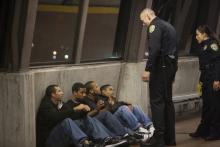
I tend to keep my heart under lock and key. I am not prone to Merton-esque revelations. My conscious mind is a far safer vantage point from which to view life’s experiences, so when a friend invited me to go see the newly released Fruitvale Station last night, I thought that was the perspective from which I would see it: my logical mind, my heart under wraps. It was about a subject with which I have no experience and only vaguely remembered from the papers a few years back. I thought it would be a perfect film for my head to be educated while my heart remained safe. I was wrong.
Fruitvale Station broke my heart open.
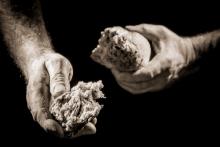
Last night, my wife Janny and I had the honor of sharing a table with a gathering of local Muslims for an Iftar meal. It is currently Ramadan, which means the Muslim community around the globe fasts everyday day from sunrise to sunset. No food. No water. No tobacco. No sex. Each night they have a celebration feast to break their daily fast called the Iftar meal. It is sacred, joyous, and a time to sit with those they love to worship the One they love, Allah (which is simply the Arabic translation of God).
It was into that sacred gathering that they expanded the table and pulled up a seat for us and a few other Christian and political leaders throughout San Diego. Their hope was simply to create space in their daily practice for their neighbors to experience life with them. They were both acknowledging city leaders who have been proactive in creating an environment of dignity and mutual relationship, and creating a space for new/renewed understanding of one another. Acknowledging our core faith differences, they made clear that it should in no way detract from our ability to share a common vision for the good of our city. We are neighbors who live, work, and play on the same streets with a common desire to see deep, charitable relationships, sustainable economy, and mutual understanding and a celebration of diversity.
As I often say, as followers of Jesus, we have no choice but to move toward relationships with those who are marginalized, dehumanized, and in need of love. We don’t compromise our faith by hanging out with people we may or may not agree with. No, in fact, we reflect the very best of our faith.

A straight-shooting white friend once commented that whenever blacks and whites are together it's like there's a "big pile of poop in the middle of the room" that everybody sees and smells but pretends isn't there.

When it comes to donating to charity, Britain’s small but fast-growing Muslim community comes out ahead of other religious groups, a recent survey shows.
Conducted by ICM, a London-based polling agency, the survey shows the U.K.’s estimated 280,000 Muslims report giving more money annually to charity than Christians, Hindus, Sikhs, and Jews.
The survey, conducted on behalf of JustGiving, an online giving platform, also found a 70 percent rise in giving over the past two years from among Muslims to the charity-giving site.
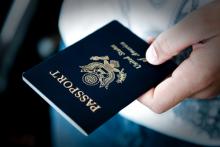
A federal appeals court has ruled unconstitutional a 2002 law that allows Americans born in Jerusalem to designate Israel as their birth country on their passports.
The lawsuit, brought by an American couple whose American son was born in Israel in 2002, challenged the government to uphold the law. Instead the court found it unconstitutional.
The State Department has not permitted Americans born in the city to list “Israel” as their birthplace on their passports, despite the law.

During a layover in the Phoenix airport on Friday, I caught the tail end of President Barack Obama’s remarks about the Trayvon Martin case. Struck by Obama’s words, I said to no one in particular, “It’s about time he said something about this.” The man next to me looked in my direction as I walked to get a snack, and I considered for a second going back and asking his impression of the president’s remarks. I kept walking toward the green licorice, but fate had other plans.
Who ended up being in seat 18B next to me? Yep. We smiled as we made eye contact, a mutual recognition that we had an overdue conversation coming and the time to have it.
For a living, I teach and facilitate dialogue. I train others how to — and why to — have challenging conversations that transform relationships and design community change. I have facilitated more than 10,000 hours of dialogue in the past 15 years.
I was feeling confident and curious. We got right into it.
“Well, looks like we are supposed to talk about it,” I said as he laughed. “What did you think of the president’s remarks?”
“I think I thought differently than you did,” John said

More Light Presbyterians, a network of congregations and individuals in the Presbyterian Church (USA) that advocates for LGBT inclusion, today announced Alex McNeill as their new executive director. McNeill is the first openly transgender person to lead a mainline Protestant organization.
McNeill, a longtime advocate for gay, lesbian, bisexual, transgendered, and queer Christians, has longstanding roots in the church.
“[The church] embodies the belief that faith calls us to action. We have a commitment to live out our call to care for the poor, for the hungry, and for the outcast. So we seek to not just teach values, but to equip people with tools for social justice,” he continued.
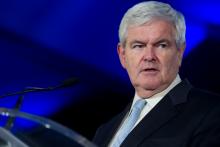
In light of the Zimmerman verdict, it’s taken my all to keep my spirit afloat. Upon the verdict’s announcement, I sat in shock and dismay, perplexed by the outcome. Despite anything revealed through the trail, a few facts remain: Martin, an unarmed teenager was followed and pursued by an armed adult, Zimmerman. Ultimately, Martin was fatally shot by Zimmerman, and Zimmerman’s received no legislative punishment for killing Martin.
Upon awakening from the trance of the verdict, I began crying as I held my four-month old son. I wept because as an African-American male, I’m fully cognizant of how dark brown skin will exacerbate his odds of being profiled and criminalized as Martin was. I am also aware that the neighborhood we reside in, by choice, on account of our faith, also increases his chances of being stereotyped. Nevertheless, irrespective of how stacked the odds are against someone, odds never define a person’s existence. Through God’s grace, communal support, social capital, hard work, and discipline my son can overcome these odds; but I must admit, my faith in this took a blow Saturday.

Oddly, I wasn't there the night George Zimmerman shot Trayvon Martin. I wasn't in the jury box either. Some commentators, like Ezra Klein and Ta-Nahesi Coates, are saying the not guilty verdict was appropriate according to Florida's "stand your ground" law. (Note that they are not saying that the Florida law is appropriate; Klein uses the word outrageous).
If this verdict was appropriate, though, what about verdicts in cases that were similar except for the color of the defendant? What happened to the "stand your ground" law when the jury reached its verdict against Marissa Alexander — an African American woman from Jacksonville, Fla.?
And anyway, why should fear of attack justify shooting to kill? It didn't in the case of John White — an African American man from Long Island, N.Y. — who shot a (white) teenager in 2006 (accidentally, he says, when the boy was trying to grab his gun).
John White, it appears, had good reason to fear the boys who showed up on his doorstep that night. That's probably why the governor commuted his sentence after he had served five months. And White no doubt should have served some time, according to New York law — his gun was unregistered, and if he hadn't been holding it when he went to the door, a scuffle probably wouldn't have escalated into manslaughter.
But, some say, the only thing that stops a bad guy with a gun is a good guy with a gun. Is this true?
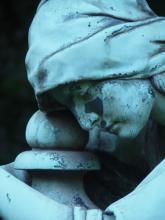
Carolyn Winfrey Gillette, a pastor who is a foster mother to a four year-old African American boy, wrote this hymn after George Zimmerman was found not guilty for his shooting of Trayvon Martin. She had read Jim Wallis’ “Lament from a White Father” and heard the Rev. Otis Moss of Chicago's Trinity United Church of Christ interviewed for the NPR report, “For The Boys Who See Themselves In Trayvon Martin.”
We Pray for Youth We Dearly Love
O WALY WALY LM (“Though I May Speak”)
Solo (optional young voice):
“If I should die before I wake,
I pray thee, Lord, my soul to take....
And if I die on violent streets,
I pray thee, Lord, my soul to keep."
(Continued at the jump)
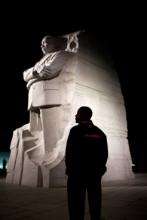
I first learned about President Obama’s comments about racism and the Trayvon Martin case last week when a Facebook friend posted a link with this comment:
“Full text of the American President’s divisive and racist remarks today. He moves smoothly into his new role as race-baiter in chief.”
My friend’s anger was matched by many others from PowerLine to Breitbart. But what I read seems to me as controversial as tomorrow’s sunrise and incendiary as wet newspaper.
Let me try an analogy.
Imagine that Joe Lieberman had been elected our first Jewish president. And that in a moment of crisis, he felt compelled to explain that some reaction to even the hint of anti-Semitism is partly explained by the Jewish cultural memory of the Holocaust. And he included personal anecdotes about growing up Jewish in America.
Would he be accused of being divisive and guilty of whatever the Jewish equivalent of “race-baiting” might be?
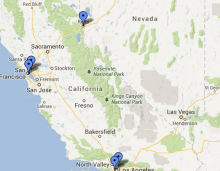
Sojourners and PICO are pleased to help highlight events in memory of Trayvon Martin around the country this Sunday, July 21.
This online event map is intended to amplify the work of congregations committed to healing our communities from the scourge of gun violence and initiate a multi-racial conversation about faith, race and justice. Please join us in this important reconciling moment of action and healing.

This morning I began preparing for a trip to Canada. I pulled out my grey North Park University hoodie to pack for the colder nights. Last year, a few days after the shooting of Trayvon Martin, North Park sponsored a justice conference. I wore that hoodie during my talk.
In retrospect, it feels like an empty gesture — an attempt to empathize with an experience that I, as a Korean-American, could never fully understand. In light of the Zimmerman verdict, I’ve been stunned into silence. I’m reeling from a deep disappointment in the American justice system and maybe even more distraught by the response of many in the white evangelical community that wants to argue the minutia of the law rather than trying to understand our brothers and sisters who are expressing a deep sense of lament.
The tragedy of Trayvon Martin requires an ongoing lament, which may be why it has been so difficult for evangelicals to engage on this issue.
President Obama addressed the nation today regarding the George Zimmerman trial, giving his thoughts on the nation's response to the verdict and the state of racism in our society.
Folks understand the challenges that exist for African-American boys, but they get frustrated, I think, if they feel that there’s no context for it or — and that context is being denied. And — and that all contributes, I think, to a sense that if a white male teen was involved in the same kind of scenario, that, from top to bottom, both the outcome and the aftermath might have been different.
You can read the full transcript of his speech here.
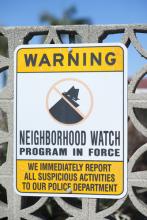
Florida’s “stand your ground” law — a source of collective ire at present — is an iteration of the Good Samaritan Laws that exist in this country: laws that offer protection from lawsuits for those who help or protect their neighbors. If you dig a hole to save a child’s life, that child’s family can’t sue you for damage to their lawn. Sounds like a good thing, right? Sounds like the spirit of these laws comes directly from the Bible.
Neighborhood Watch programs are born from the same spirit: they empower those who want to protect their neighbor with the authority to do so. George Zimmerman was allowed to have a gun so that he could be a Good Samaritan.
The problem with Neighborhood Watch programs and stand your ground laws is that, in their rush to be the Samaritan in the story, they never ask the question the lawyer asks in Luke 10: “Who is my neighbor?”
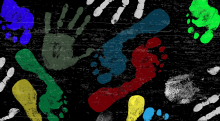
What better way to honor Nelson Mandela on his 95th birthday today than to reflect on his concept of Ubuntu? Ubuntu, a word from the Bantu languages of southern Africa — roughly translated “I am because we are” — sums up Mandela’s approach to leadership, incorporating a generous spirit and concern for the wellbeing of one’s community.

The acquittal of a person who is not black for the murder or beating of a black person is nothing new: Remember Yusef Hawkins. Remember Rodney King. Remember Amadu Diallo. Remember Alex Moore. Remember Latasha Harlins. Remember Sean Bell. Remember… remember… remember.
Many of us can recall these names without much effort. So, why is the death of Trayvon Martin so different?
It’s different because of the law — and the timing.
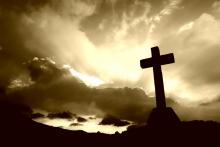
Summertime is "revival season" for Christians of various denominations. Traditionally revivals, or "Great Awakenings", have preceded most major movements in American society, like the Revolutionary War and the Civil War. Revival involves not only a supernatural outpouring of the Holy Spirit but an intense time of confession, repentance, and crying out to God to make us and our communities right.
This summer will mark two major Civil Rights anniversaries: the 50th Anniversary of the March on Washington and 58th Anniversary of Emmitt Till’s death. It is my belief that providence provides us with divine appointments that can be overlooked as coincidences if we do not have the spiritual eyes to see. This summer appears to be one of those times of divine appointment.
The American Church has never truly mourned and repented of its original sin of racism, and sadly this sin has infected the Body of Yahshua (Christ) globally.
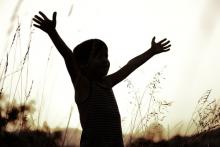
So,
No prom for you
Dear boy
No wedding
No children
No memories of you and family
For momma and daddy to savor
Just holes in their hearts to match
the hole
In yours
But as God is my witness
Sweet boy
You will never be forgotten

Driving through the Spanish moss-draped gates of the Mepkin Abbey Trappist monastery in Moncks Corner, S.C., businessman August Turak felt as if he had just lost a whole lot of weight.
Not physical weight, but the weight of emotional and spiritual burdens.
After a corporate career with companies like MTV, Turak sold two successful software companies for $150 million, but shattering his ankle in a skydiving accident “brought me face to face with my own mortality.”